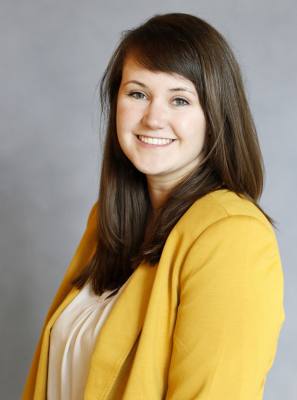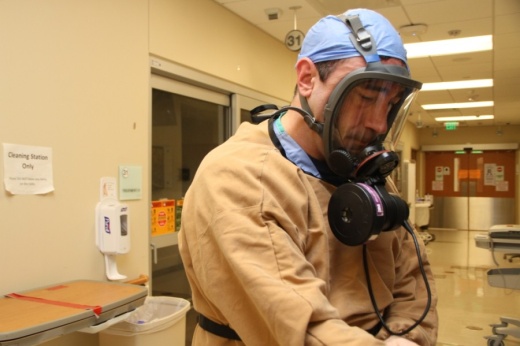“At the very beginning, it was very tough, very unpredictable as we got all of our safety measures into place,” said Jaquez, a Houston Methodist West Hospital registered nurse who helped design the ER COVID-19 unit. “Things changed on a daily basis, so it made it very difficult, very, very scary, too, because we didn't know the massive impact.”
Over time, Jaquez and his ER team adjusted to the new operations and safety portals, such as wearing personal protection equipment, enacting triage procedures and conducting a cleaning regiment at home to protect family members.
Maintaining safety for employees and patients is a priority for Houston Methodist, said Vicki Brownewell, the vice president and chief nursing officer at Houston Methodist West.
None of Houston Methodist West’s front-line staff in the ER have had to be sent home for contracting the disease while treating patients, she said. And she stressed that hospitals are safe for all care, including medical emergencies such as heart attacks or broken bones.
“It is very safe to receive hospital care right now,” Brownewell said. “If you need surgery or elective procedures, we’re the safest we’ve ever been.”
Boosting morale
Post-traumatic stress disorder is a real concern for nurses during the pandemic, said Kathryn Tart, founding dean of the University of Houston’s College of Nursing and the Humana Endowed Dean’s Chair in Nursing, which offers courses at the University of Houston at Katy instructional site.

“COVID-19 is a terrible death,” Tart said. “Patients suffocate on their bodily fluids. Nurses are the ones that are there. It’s not the physicians at the side of the bed; it’s us.”
Stefan Huffman, a registered nurse at Memorial Hermann Katy, said he has seen the highs and lows in the intensive care unit.
“You get those really awesome moments where you feel that victory, whether it's COVID or some other type of illness where you're really elated when you see a patient recover,” he said. “We see the other side of it, too, where patients don’t recover, and it’s really sad. It’s part of the job.”
Huffman has been a registered nurse for almost two years and said the pandemic has helped him learn more about what it means to be a nurse.
“In a lot of ways, it’s brought me up to speed even quicker of how things can happen and face the things that we face as a nurse, putting ourselves on the line,” he said. “As one of the younger nurses on the team, it’s been awesome to work with veteran nurses with 10-plus years who have seen it all ... especially going through something unknown like this.”

Houston Methodist has done much to keep staff spirits up during the pandemic, including creating fitness and meditation videos and providing programs to allow employees talk to professionals about the stress and trauma they may be experiencing during the coronavirus pandemic, Brownewell said.
Jaquez said he stayed motivated with the help of his colleagues, who are like a second family.
“As we got everything in a place and felt a lot more comfortable, we just realized that we're doing things that were helping people,” he said. “Our staff keeps telling us, ‘We love what you're doing here. You make us feel safer.’ And once we started hearing that, it just made us feel like we're doing something right.”
The Katy community has also stepped up, Brownewell added. Silversand Services, a local landscaping company, created a heart out of plants and installed a star that lights up at night at Houston Methodist West.
“The community has been totally amazing,” she said. “Children have sent artwork, and others have sent food and treats.”
Meeting the virus 'head on'
Tart and Brownewell pointed out that every nursing specialty—in addition to intensive care unit and emergency room nurses—have had to adapt to the coronavirus.
“Nurses have to ask themselves, ‘How am I going to protect this neonate, my patient with open heart surgery, my patient with a cancer diagnosis [from the coronavirus] on top of everything else?’” Tart said.
Nurses, no matter their specialty, also must wear more personal protective equipment, Brownewell said, pointing out that patients cannot see a nurse smile when he or she has a face mask. More health care touchpoints are becoming virtual, too, Tart added.

And during the coronavirus pandemic, many nurses have had to help out in different departments, they said. For example, an operating room nurse may be asked to help out in the ICU to assist the staff in making sure all the infection-control protocols are followed, Brownewell said.
“They have been amazing,” Brownwell said of the nurses she oversees. “They’ve been more than happy to take care of their coworkers in addition to the patients. This has brought the team together in ways we could have never predicted.”
Although a lot may have changed in hospitals to make them safe during the coronavirus and there are still many unknowns about the coronavirus, nurses have been trained in dealing with pandemics and infections since Crimean War in the 1850s and Spanish Flu in 1918, Tart said. Isolating and separating patients as well as washing hands has been a long-established practice to combat infections and pandemics, she said.
“We know how to this because this is what we do,” Tart said. “We’re not running away from it; we’re meeting it head on.”

In fact, neither UH nor Houston Community College have experienced a slowdown in nursing students for the next semester, said Tart and Phillip Nicotera, the president of HCC’s Coleman College of Health Sciences.
Tart said her current cohort of nursing students have been inspired by their faculty to continue their studies, and she has a positive outlook for the future of the industry.
“Nurses are brave, smart and caring people,” Tart said, “COVID-19 is new, but I don’t think it will scare people away from the profession. Nurses have taken care of people with H1N1, MERS, SARS, AIDS, ebola and will continue to care for all patients.”





